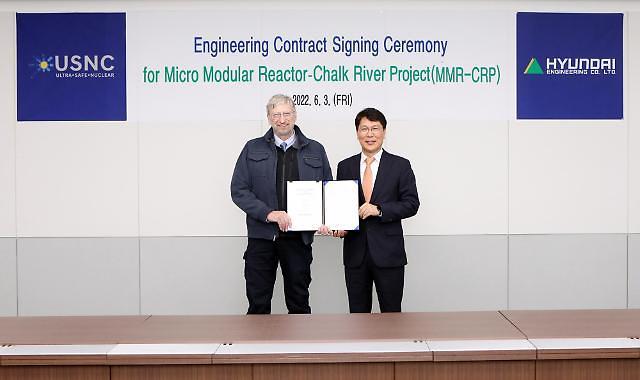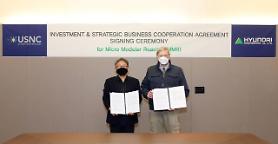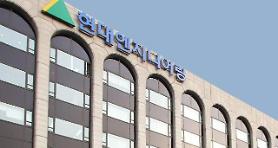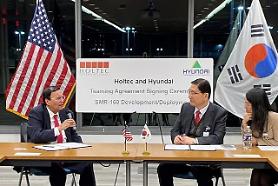
[Courtesy of Hyundai Engineering ]
Small modular reactors (SMRs) have been studied to address the limitations of traditional light-water reactors using low-enriched uranium that cost a lot to replace nuclear fuel and require a vast emergency evacuation zone, nonproliferation and waste management. Small reactors designed with modular technology allow for less on-site construction, increased containment efficiency, and enhanced safety.
An electrical high-temperature gas-cooled micro modular reactor (HTGR) developed by Ultra Safe Nuclear Corporation (USNC) is a fourth-generation nuclear energy system that delivers heat and power to remote mines, industries, and communities.
In January 2022, Hyundai Engineering (HEC) secured exclusive rights to USNC's global engineering, procurement and construction (EPC) business through an equity investment worth $30 million. The two companies would develop a new reactor by upgrading micro modular reactor (MMR) technologies.
USNC and HEC, together with the state-run Korea Atomic Energy Research Institute, have carried out basic design under an agreement to develop HTGR technologies and investigate applications in South Korea. The HTGR system can conceptually have an outlet temperature of 750 degrees Celsius that enables applications such as process heat or hydrogen production via the thermochemical sulfur–iodine cycle.
In Ontario, Canada, USNC’s five megawatts electrical (MWe) microreactor has been selected for an SMR project at the Chalk River Laboratories. USNC’s energy system consists of the nuclear plant that generates heat and the adjacent power plant that converts heat into electricity or provides process heat for industrial applications.
HEC said it has signed a detailed design contract with USNC for their MMR demonstration project to achieve commercial operation in 2026. They agreed to push for MMR EPC business in Canada, the United States, and Poland.
A South Korean team led by HEC signed an agreement with Canadian teams In December 2021 to build a 100 MWe small modular reactor in Alberta, a province in Western Canada, using sodium-cooled fast reactor technology. HEC is in charge of EPC, while KAERI will develop a sodium-cooled fast reactor (SFR) for long cycle power generation. SFR is a fast neutron reactor cooled by liquid sodium. Sodium's chemical reactivity requires special precautions to prevent and suppress fires. If sodium comes into contact with water it reacts to produce sodium hydroxide and hydrogen, and the hydrogen burns in contact with air.
HEC's sister company, Hyundai E&C, forged a partnership in November 2021 with Holtec International, a U.S. company specializing in the design and manufacture of parts for nuclear reactors. Holtec's SMR-160 is a pressurized water reactor with a capacity of 160 MWe that does not rely on any pumps or motors to remove heat from the nuclear fuel.
Hyundai E&C and Holtec have agreed to participate in the decommissioning of defunct nuclear power plants, starting with the Indian Point Energy Center in Buchanan in Westchester County. Indian Point's three-unit nuclear power plant station shut down at the end of April 2021 after 45 years of operation. Holtec's decommissioning plans for Indian Point include moving used nuclear fuel from pools into a dry storage system, and dismantling and packaging highly activated parts from the nuclear reactors in high capacity containers.
Copyright ⓒ Aju Press All rights reserved.




